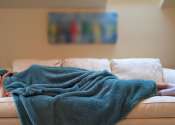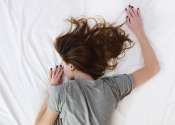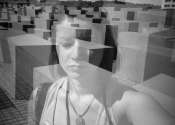Last update:
Sleep disorders news
Dentistry
FDA said it never inspected dental lab that made controversial AGGA device
The FDA never inspected Johns Dental Laboratories during more than a decade in which it made the Anterior Growth Guidance Appliance, or "AGGA," a dental device that has allegedly harmed patients and is now the subject of ...
2 hours ago
0
0
Neuroscience
Research links sleep apnea severity during REM stage to verbal memory decline
A research team led by the University of California, Irvine has revealed the link between the frequency of sleep apnea events during the rapid-eye-movement stage and the severity of verbal memory impairment in older adults ...
May 14, 2024
0
29
Can eating or drinking caffeine before bed impact your health?
Before bed, we might think of eating a late-night snack or drinking something that may have an impact through the night. Roberta Anding, registered dietitian and assistant professor in the Baylor College of Medicine's Joseph ...
May 14, 2024
0
18

Parasomnia: What happens inside a sleepwalker's brain?
Researchers at the Netherlands Institute for Neuroscience have taken a first step in exploring a rather complex question: what is happening inside the brain of somebody who may be considered "stuck" between sleep and wakefulness?
May 13, 2024
0
9

New paper examines potential power and pitfalls of harnessing artificial intelligence for sleep medicine
In a new research commentary, the Artificial Intelligence in Sleep Medicine Committee of the American Academy of Sleep Medicine highlights how artificial intelligence stands on the threshold of making monumental contributions ...
May 13, 2024
0
8

Partner talks in their sleep? Here's how to slumber soundly
Parasomnia—it's a blanket term for pesky behaviors that wreak havoc on your sleep. A third of U.S. adults get less than the recommended amount of shut-eye, a nationwide struggle linked to chronic diseases ranging from depression ...
May 11, 2024
0
9

Researchers show impact of insomnia and depression on asthma control
Researchers at National Jewish Health have shown that underlying mood and sleep disorders negatively impact asthma control. Data reveal a considerable interaction between insomnia, depression and obstructive sleep apnea in ...
May 10, 2024
0
0

Sleep problems as a child may be associated with psychosis in young adults
Children who experience chronic lack of sleep from infancy may be at increased risk of developing psychosis in early adulthood, new research shows.
May 8, 2024
0
65

Insights into insomnia: A comparison of self-reported data and primary care records in UK Biobank
General population (GP) data can provide unique insights into common health conditions, new research looking at insomnia symptom prevalence in England has shown. The University of Bristol-led study, published in BMJ Open, ...
May 8, 2024
0
0

Sleep apnea patients can breathe easy about CPAP therapy, computer simulations suggest
Using a computational model representing the full respiratory tract, researchers from the University of Technology Sydney (UTS) have confirmed the safety of CPAP therapy, addressing concerns about potential damage to lung ...
May 8, 2024
0
0

We know late-night screens are bad for sleep. How do you stop doomscrolling in bed?
Like many of us, Jessica Peoples has heard the warnings about excessive screen time at night. Still, she estimates spending 30 to 60 minutes on her phone before going to sleep, mostly scrolling through social media.
May 8, 2024
0
0

Why sleep soothes distress: Neurobiology explained
A study published in Nature Reviews Neuroscience by an international team including the Woolcock's Dr. Rick Wassing examined research into sleep disorders over more than two decades to prove a good night's sleep is the perfect ...
May 7, 2024
0
53

Could getting enough sleep help prevent osteoporosis?
As part of the University of Colorado Department of Medicine's annual Research Day on April 23, faculty member Christine Swanson, MD, MCR, described her clinical research on whether adequate sleep can help prevent osteoporosis.
May 7, 2024
0
0

Behavioral therapy and sleep: A lifeline for night workers
If you are a police officer, a health care worker, a firefighter or even a miner, you may be part of the 25% to 30% of the population with atypical working hours.
May 6, 2024
0
0

Popular teenagers sleep less than their peers, study finds
Due to a later melatonin onset and increased alertness in the evening, teenagers often find it hard to fall asleep at a time that would allow them to clock up the recommended eight to ten hours of sleep each night.
May 1, 2024
0
44

Low oxygen during sleep and sleep apnea linked to epilepsy in older adults
Sleep apnea and low oxygen levels while sleeping are associated with epilepsy that first occurs after 60 years of age, known as late-onset epilepsy, according to a new study published in Sleep.
Apr 30, 2024
0
19

Get better sleep with these 5 tips from experts
Spending too many nights trying to fall asleep—or worrying there aren't enough ZZZs in your day? You're not alone.
Apr 23, 2024
0
1

Getting a good night's rest is vital for neurodiverse children—pediatric sleep experts explain why
Most of us are all too familiar with the consequences of a poor night's sleep—be it interrupted sleep or simply too little of it. If you're a parent with kids at home, it often leaves you and your children on edge.
Apr 19, 2024
0
0

Weight-loss drug Zepbound eases sleep apnea in company trials
Zepbound, one of the wildly popular weight-loss drugs that millions of Americans now take, eased sleep apnea in obese adults in two company trials, drug maker Eli Lilly announced Wednesday.
Apr 17, 2024
0
0

Could lack of sleep increase your risk of type 2 diabetes?
Not getting enough sleep is a common affliction in the modern age. If you don't always get as many hours of shut-eye as you'd like, perhaps you were concerned by news of a recent study that found people who sleep less than ...
Apr 17, 2024
0
8












































